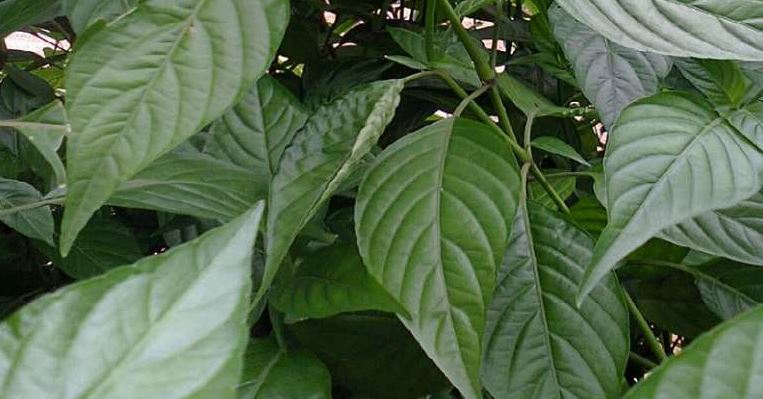Surprising Health Benefits of Malabar Spinach

Malabar Spinach, also known as Amunututu leaf or Nigerian spinach, is a leafy green vegetable gaining popularity due to its numerous health benefits. This nutritious leaf contains essential vitamins and minerals, including dietary fiber, sodium, iron, manganese, potassium A, C, folic acid, and carotenoids.
15 Surprising Health Benefits of Malabar Spinach
This Nigerian leaf vegetable has been used traditionally to improve overall health and well-being. In this article, we will explore 15 fantastic health benefits of Malabar Spinach, making it a valuable addition to your diet.
1. Nourishes Skin
Rich in Antioxidants
Malabar Spinach is rich in vitamins A and E, potent antioxidants that help maintain healthy and youthful skin. These antioxidants protect your skin from harmful results of free radicals, which can result in damaging premature aging, wrinkles, and freckles.
Promotes Skin Health
The high vitamin A levels in Malabar Spinach also promote skin health by maintaining essential skin attributes such as cell turnover and collagen production. Sound effects like this will keep your skin supple and elastic, reducing the appearance of fine lines and wrinkles.
2. Reduces the Risk of Diabetes
Improves Blood Sugar Control
Dietary fiber is crucial for preventing diabetes, as it helps improve blood sugar control. With fiber content, Malabar Spinach can lower sugar absorption into the bloodstream, with as many benefits in preventing spikes in blood sugar and decreasing the potential risk of developing type 2 diabetes.
Supports Healthy Insulin Response
Like that provided by Amunututu leaf, a fiber-rich diet can also support a healthy insulin response. This is important for maintaining stable blood sugar levels and preventing insulin resistance, a critical factor in the development of diabetes.
3. Reduces Bad Cholesterol Levels
Lowers LDL Cholesterol
Malabar Spinach's high dietary fiber content helps to lower bad cholesterol (LDL) levels in the body by reducing its absorption in the digestive tract. By preventing the buildup of LDL cholesterol, you effectively wall off heart disease and other cardiovascular issues.
Supports Heart Health
In addition to lowering LDL cholesterol levels, Amunututu leaf also contains potassium and manganese, which help to regulate blood pressure and support overall heart health. Maintaining healthy blood pressure levels can reduce your risk of heart attacks and strokes.
4. Reduces the Risk of Cancer
Fights Free Radicals
Malabar Spinach contains powerful antioxidants, such as carotenoids and vitamins A and C, which can strengthen the body against free radicals' destructive effects. Free radicals can be harmful and unstable molecules that may damage the cells and DNA, leading to cancer development.
Supports Healthy Cell Function
By neutralizing free radicals, the antioxidants in Malabar Spinach support healthy cell function and reduce the risk of cancer development. This includes cancers of the lung, oral cavity, and other parts of the body.
5. Controls Blood Pressure
Regulates Heart Rate and Blood Pressure
The potassium and manganese content in Malabar Spinach helps maintain a healthy heart level. These essential minerals support the proper functioning of the cardiovascular system, preventing hypertension and maintaining healthy blood pressure levels.
Reduces the Risk of Cardiovascular Issues
By maintaining normal blood pressure levels, Malabar Spinach can reduce your risk of developing cardiovascular and harmful issues such as heart disease, heart attacks, and strokes.
6. Treats Stomach Ache
Soothes the Digestive Tract
Amunututu, which means "cool stomach" in Nigerian, is believed to slow down the digestive tract and alleviate stomach aches. The soluble fiber content in Amunututu leaf helps to promote healthy digestion, reducing inflammation and discomfort associated with ulcers and other digestive issues.
Supports Gastrointestinal Health
In addition to soothing stomach aches, Malabar Spinach leaf supports overall gastrointestinal health by promoting regular bowel movements and preventing constipation. This can help to maintain a healthy digestive system and reduce the risk of developing gastrointestinal issues.
7. Improves Body Metabolism
Maintains Red Blood Cell Production
Iron is a proven mineral that can produce red blood cells while transporting oxygen throughout the body. Malabar Spinach is a good iron source, helping maintain average red blood cell production and support healthy body metabolism.
Boosts Energy Levels
By facilitating oxygen transport in the body, the Amunututu leaf helps to boost energy levels and improve overall physical performance. For this critical reason, it can be a precious addition to the diets of sportsmen or women looking to increase their energy levels throughout the day.
8. Good for Pregnancy
Supports Fetal Development
Malabar Spinach is rich in B-complex vitamins and folate, essential for fetal development during pregnancy. Folate, in particular, plays a crucial role in DNA growth and helps prevent neural tube defects in the developing baby.
Promotes a Healthy Pregnancy
Malabar Spinach can help support a healthier pregnancy and reduce the risk of pregnancy-related issues by providing essential nutrients such as folate and B-complex vitamins. Pregnant women should consider including Amunututu leaf in their diets to support their health and their developing baby's health.
9. Supports Bone Health
Rich in Calcium
Amunututu leaf is a good source of calcium, which can help people develop strong bones and teeth. Regularly consuming calcium-rich foods like Amunututu leaf can help maintain bone density and prevent conditions such as osteoporosis.
Supports Bone Formation
In addition to its calcium content, Malabar Spinach is rich in healthy minerals like magnesium and phosphorus, essential for bone formation and maintenance. By providing these crucial nutrients, Amunututu leaf supports situations like good bone health and reduces the risk of bone-related issues.
10. Promotes Weight Loss
High in Fiber
Amunututu leaf's high fiber content can help support weight loss through its fullness tendency and reduce overall calorie intake. Fiber-rich foods like Malabar Spinach can be extremely useful in scenarios such as overeating.
Low in Calories
Malabar Spinach is a low-calorie food that is an ideal addition to any weight-loss diet. You can create a calorie deficit and promote weight loss by replacing higher-calorie foods with nutrient-dense, low-calorie options like Amunututu leaf.
11. Boosts Immune System
Rich in Vitamin C
Malabar Spinach is an excellent vitamin C source that supports the immune system. Vitamin C helps to quicken the production of white blood cells immensely by helping fight off infections and protect the body against illness.
Supports Overall Immunity
In addition to its vitamin C content, Malabar Spinach also contains other immune-boosting nutrients such as vitamin A and iron. By providing these essential nutrients, Malabar Spinach can help to support overall immune system function and maintain good health.
12. Enhances Eye Health
Contains Beta-Carotene
Amunututu leaf is a rich source of beta-carotene, a precursor to vitamin A, essential for maintaining good eye health. Beta-carotene helps to protect the eyes against oxidative damage and reduces the risk of age-related eye diseases such as macular degeneration and cataracts.
Supports Healthy Vision
In addition to beta-carotene, Malabar Spinach also contains other critical, required nutrients, such as lutein and zeaxanthin, which support healthy vision and protect the eyes from catastrophic damage caused by exposure to blue light.
13. Improves Cognitive Function
Rich in Antioxidants
The antioxidants present in Malabar Spinach, such as vitamins A and C, help protect the brain against oxidative damage, leading to cognitive decline and memory loss.
Supports Brain Health
Amunututu leaf also contains essential nutrients such as iron, potassium, and manganese, which support overall brain health and cognitive function. By including Malabar Spinach in your diet, you can help to maintain good brain function and improve memory and concentration.
14. Alleviates Anemia
High in Iron
Iron is a well-known mineral that can produce essential hemoglobin, which carries oxygen throughout the body. Consuming iron-rich foods like Malabar Spinach can help to increase hemoglobin levels and alleviate the symptoms of anemia. Amunututu leaf's high iron content makes it an ideal food for individuals with anemia.
Supports Red Blood Cell Production
In addition to its iron content, Malabar Spinach contains other essential nutrients, such as vitamin C and folic acid, which support red blood cell production and overall blood health. By including Amunututu leaf in your diet, you can help to combat anemia and improve overall energy levels.
15. Detoxifies the Body
Rich in Chlorophyll
Malabar Spinach is rich in chlorophyll, a natural detoxifier that helps to keep the body off toxins and impurities. Chlorophyll can help to improve liver function, support the elimination of harmful substances from the body, and promote overall detoxification.
Supports Digestive Health
The high fiber content in Malabar Spinach also aids detoxification by promoting regular bowel movements and preventing constipation. Doing this can help maintain a healthy digestive system and supports the body's natural cleansing processes.
In conclusion, Malabar Spinach is a nutrient-dense, versatile vegetable with numerous health benefits. Whether you want it in a salad, stir-fry, or smoothie, Amunututu leaf is a valuable addition to any meal plan. You can support overall health and well-being by including Malabar Spinach in your diet while enjoying its delicious taste.




